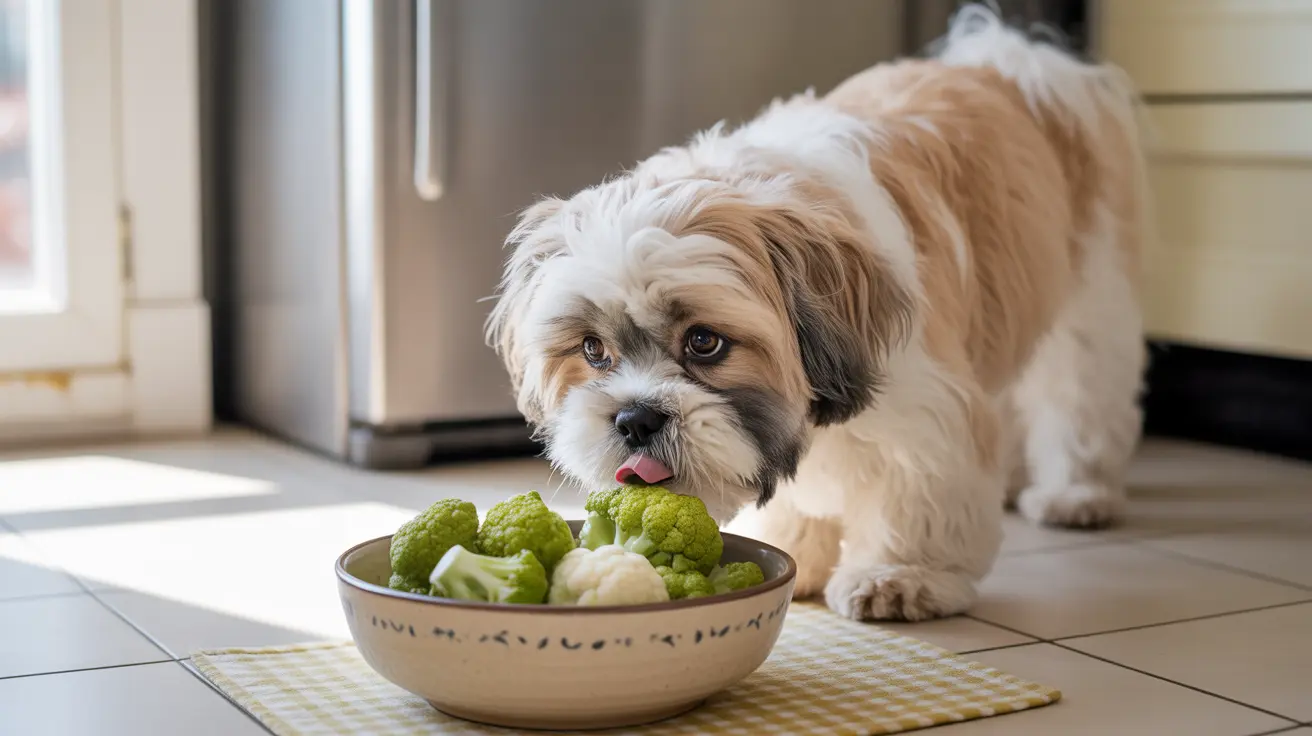Many pet parents wonder about adding vegetables to their dog's diet, and cauliflower is often a topic of interest. The good news is that dogs can safely eat cauliflower, and this versatile vegetable offers several nutritional benefits when served properly.
This comprehensive guide will explore everything you need to know about feeding cauliflower to your canine companion, from its health benefits to proper serving sizes and preparation methods.
Is Cauliflower Good for Dogs?
Cauliflower is indeed beneficial for dogs when served in moderation. This low-calorie vegetable contains essential nutrients that can support your dog's health:
- Vitamin C for immune system support
- Vitamin K for bone health
- Fiber for digestive health
- Antioxidants for cellular protection
- Potassium for heart and muscle function
- B-vitamins for energy metabolism
With only 25 calories per 100 grams and being 92% water, cauliflower makes an excellent treat for dogs on weight management plans.
Safe Preparation Methods
The way you prepare cauliflower can significantly impact its digestibility and safety for your dog. Here are the best preparation methods:
Cooking Methods
- Steam or boil until slightly tender
- Avoid using oils, butter, or seasonings
- Let cool completely before serving
- Cut into small, bite-sized pieces
Raw Serving Tips
- Wash thoroughly to remove pesticides
- Chop into small pieces to prevent choking
- Start with tiny amounts to test tolerance
- Monitor for any digestive issues
Portion Size Guidelines
While cauliflower is healthy, portion control is crucial to prevent digestive issues:
- Small dogs: 1-2 small florets per serving
- Medium dogs: 2-3 florets per serving
- Large dogs: 3-4 florets per serving
Remember that treats, including vegetables, should make up no more than 10% of your dog's daily caloric intake.
Potential Risks and Considerations
While cauliflower is generally safe, be aware of these potential issues:
- Gas and bloating from overconsumption
- Choking hazards if pieces are too large
- Possible digestive upset when introduced too quickly
- Rare allergic reactions
Frequently Asked Questions
Can dogs safely eat cauliflower, and is it better to feed it raw or cooked?
Yes, dogs can safely eat cauliflower both raw and cooked, though cooked cauliflower is generally easier to digest. Steamed or boiled cauliflower (without seasonings) is the best option as it maintains nutritional value while being gentler on the digestive system.
What are the health benefits of giving my dog cauliflower as a treat?
Cauliflower provides numerous health benefits for dogs, including fiber for digestive health, vitamins C and K for immune support and bone health, and antioxidants for cellular protection. It's also low in calories, making it an excellent treat for weight management.
How much cauliflower can I give my dog without causing digestive issues?
The appropriate amount depends on your dog's size. Small dogs should have 1-2 small florets, medium dogs 2-3 florets, and large dogs up to 4 florets per serving. Never exceed 10% of their daily caloric intake from treats, including cauliflower.
Are there any risks or precautions I should know before feeding cauliflower to my dog?
The main risks include gas and bloating from overconsumption, choking hazards if pieces are too large, and potential digestive upset if introduced too quickly. Always start with small amounts and monitor your dog's reaction.
How should I prepare cauliflower for my dog to ensure it is safe and easy to digest?
Cut cauliflower into small, bite-sized pieces and either serve raw (well-washed) or lightly steamed/boiled without any seasonings, oils, or additives. Allow cooked cauliflower to cool completely before serving.
Conclusion
Cauliflower can be a healthy and nutritious addition to your dog's diet when served properly. By following the guidelines for preparation and portion sizes, you can safely incorporate this vegetable into your pet's treat rotation. Always monitor your dog's reaction when introducing any new food, and consult with your veterinarian if you have specific concerns about your pet's diet.






